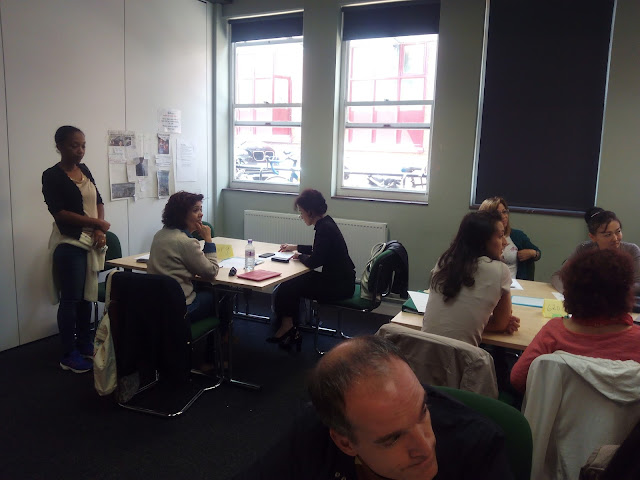Thursday 9th July 2015
- TEACHING GRAMMAR
- CULTURAL EXCHANGE
- FREE SCHOOLS. LANGUAGE ACTIVITY
TEACHING GRAMMAR
Today´s first lesson was about Teaching grammar. Grammar is an important aspect of a language, though nowadays language communication methods tend to focus more on effective communication rather than on grammar accuracy.
Some years ago, one of the methods which emphasized teaching grammar was the well known method “ grammar translation”. It consisted of reading and translating texts, as if it was latin. Also, its aim was not to communicate at all, but to show off. Time passed by and this method turned out to be inappropriate because not only learners were not able to communicate, but also it was dull and tough.
Currently, the widely method for teaching English as a foreign language is the Communicate approach. As its name indicates, it focuses on communication and contrary to grammar-translation method, leaves accuracy apart. This means that despite learners can establish conversations and convey messages, they are not accurate at all. Due to this situation, we as teachers have the task of encouraging our learners to communicate without neglecting grammar rules.
ENGLISH AS A LINGUA FRANCA
As far as ELF is concerned, it stands for English as a Lingua Franca and refers to non native speakers communicating in English. Therefore, there are people who argue in favour of teaching English as ELF what implies teaching it just as a tool of communication with non English speakers. As a result of this, sociocultural aspects may not be taken into account. On the contrary, teaching English as a foreign language aims at communicating with native speakers, giving prominence to cultural aspects.
Sociocultural aspects are a very important issue of the process of communication with native speakers, as they cover a verbal and a non verbal code of what is acceptable and not, in the target culture. If these norms are not taught, there may be miscommunication. Because of this, it´s very important to help our pupils build a socio-cultural awareness in order to speak English with native speakers in an successful way.
As regards misunderstanding problems, they may occur not only because of the lack of socio-cultural awareness but also because of not managing the grammar rules properly. For this reason, getting to know grammar is important, whereas teaching grammar rules is not effective at all. The best way of teaching grammar is noticing it by reading books, for example. Another way of teaching grammar is by using a PPP (Presentation Practice Production) method; production is the most important stage of the process and is left behind. Thus, we should give our pupils the opportunity to produce more.
CULTURAL EXCHANGE
The second lesson of the day was a cultural exchange with some other teachers from France, Uzbekistan and Switzerland. We were splitted into small groups of four people in which there were at least two spanish teachers per group: one from primary and another from secondary. The aim of the gathering was to discuss on several topics, closely related to each member´s educational system.
The activity itself was very meaningful as it allowed us to share our different points of view through English language. In addition to this, the cultural exchange helped us enhance our knowledge of some other educational systems. When comparing teaching situations, we become aware of the possible strengths and weakness of our educational systems. Although there are many aspects which should be improved, others especially worthy of notice are taken for granted.
FREE SCHOOLS. LANGUAGE ACTIVITY
In the afternoon, there was a debate about how different issues such as parents, teachers, government, social background, head teacher and the child himself influence his education. Many of us supported the idea that families are the most influential factor in children´s lives. However, some other people argued that each child´s background was undoubtedly a crucial aspect on children´s lives. Also there were those who thought that the child´s himself was the key. To my mind, it is relatively difficult to theorize about what has more effect on a child´s life because each case is completely different and there are many variables to be taken into account.
Finally Jo explained to us what academies and free schools in England, are. It was really interesting because these types of schools are not common in Spain. Academies are publically funded, independent schools and held accountable through a legally binding ‘funding agreement’. They also have freedom over the curriculum design. However, free schools are new schools set up by parents, teachers or educational charities among others. They are independent and are not ruled by any local authority. Thus they don't have to follow the national curriculum.
Further information:




No comments:
Post a Comment